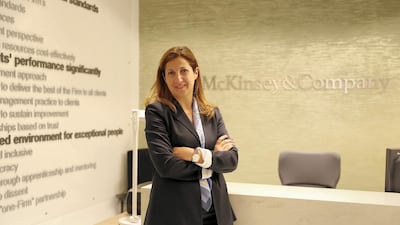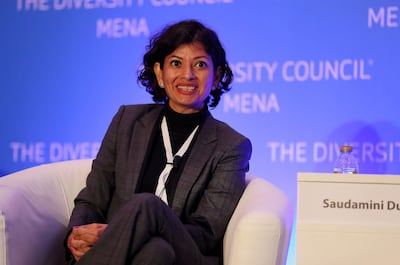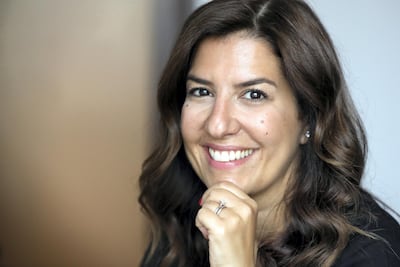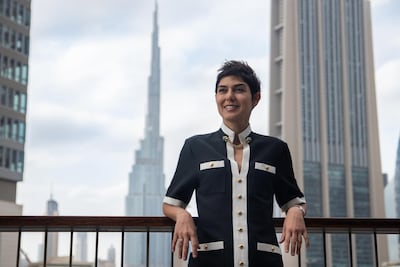When Rima Assi, a senior partner at McKinsey in Abu Dhabi, joined the management consultancy firm in 2006, there were three women employed in the Middle East office. Now there are more than 220.
Ms Assi, who has led McKinsey’s diversity and inclusion efforts in the region for the past decade, this year became one of the first two female senior partners in the Middle East office.
“This is something that is a long, transformative journey,” says Ms Assi. “It requires time and effort, and initiative after initiative.”
Supporting women employees at McKinsey Middle East has included increasing maternity leave, limiting travel for new mothers, providing mentorship, running workshops on unconscious biases and setting hiring targets. And McKinsey is not the only company in the UAE making changes; other global firms, such as Accenture, PwC and Axa are doing the same. They are all solving the same problem: how do we attract and retain more women?
It is a global issue that has garnered increased attention in recent years, whether centred on narrowing the gender pay gap, combating discrimination or introducing more flexible working policies.
In the UK, for example, regulations that came into effect in April 2017 require companies with more than 250 employees to report their gender pay gap figures. Over the last two years of reporting, the gap has shrunk marginally from 9.7 per cent to 9.6 per cent. Almost eight in 10 companies still pay their male employees more, according to figures published in April of this year.
In the UAE, the government has taken important steps indicating that gender balance is a national priority. Last year the UAE cabinet endorsed a bill ensuring equal pay for men and women. Currently in 46th place in the United Nations Development Programme’s Gender Inequality Index, the UAE aims to be one of the world’s top 25 countries for gender equality through its Vision 2021.
But some multinational companies have gone further than the requirements stipulated by the government. The UAE Labour Law states that women are entitled to maternity leave of 45 days and gives no provision for paternity leave. The new Dubai International Financial Centre Employment Law, which came into effect in June, allows for maternity leave of 65 working days, with the first half at full pay and second at half pay, and paternity leave of five days.
Meanwhile, McKinsey, which has its Middle East headquarters at DIFC, gives four months' maternity leave and eight weeks for new fathers. It is a generous allowance when compared to other companies, says Ms Assi, but a necessary one because of the high demands of the consultant lifestyle.
“As I started growing in the firm, I realised how difficult it is for our women colleagues to stay … driven by lifestyle demands, by continuous travel, by family responsibilities, becoming mothers and how to balance that,” she says.
In her diversity and inclusion role, Ms Assi helped ensure policies were developed to support and retain women. The latest, announced in December of last year, provides that any woman returning from maternity leave will have no travel guaranteed for six months. “In our line of business, these are the type of things that make a big difference,” says Ms Assi.
There is also a big emphasis on mentorship, because “as we look at psychology and empirical evidence, we see that women reach out much less and men reach out much less to women", she says.
Finally, she and the Middle East office organise speakers and training on unconscious biases, especially when it comes to recruitment, reviews and performance management. “CEOs that are known to be humble are actually highly acclaimed, but women that are known to be humble in the work environment are looked down on,” says Ms Assi. “So it’s interesting how you have the same characteristic that plays out very differently for gender.”
Last year McKinsey’s new global managing partner Kevin Sneader set a goal of achieving 50 per cent representation of women at undergraduate intake across 27 North American offices by 2020. McKinsey Middle East, where about a third of total employees are women, has set a similar target. “We don’t believe it’s easy, [but] we believe it’s possible,” says Ms Assi.
In its own research, McKinsey has demonstrated the benefits of hiring more women, especially at the top. According to its January 2018 Delivering through Diversity report, companies in the top-quartile for gender diversity on executive teams were 21 per cent more likely to outperform on profitability and 27 per cent more likely to have superior value creation.
Accenture, which currently has 43 per cent women employees on a global level, has also set a 50 per cent target by 2025 and a 25 per cent target for senior executives. Accenture Middle East joined the newly established Diversity Council Mena, an accelerator with the goal of advancing more women into leadership positions, in July.
“There’s a lot of support coming from different areas right now — be it at a cultural level, a societal level and a corporate level,” says Saudamini Dubey, managing director of Accenture Digital in the Middle East. “We need to ensure that, as organisations, we’re not only ready to attract the right talent, but also available to nurture and grow our people through mentorship programmes, learning paths et cetera and make the most of this change that we’re seeing on the ground.”
Norma Taki, in addition to being a partner at PwC in Dubai, took on the role of Middle East diversity and inclusion leader in October. Her aim is to increase the number of women at all levels, but especially at the partner level, and make women feel more included within the organisation.
Of the 6,000 PwC employees across 12 territories in the region, 36 per cent are women. The company has set a target of hiring 50 per cent at the entry level, currently at 45 per cent. Ms Taki says on the partnership level, they want to move the current 10 per cent to 20 per cent. “We do believe in targets, because that’s the only way you move the needle,” she says.
PwC Middle East also changed its maternity leave policy two years ago, increasing it to three months paid and three months unpaid. On Father’s Day in June, the company tripled its paternity leave to three weeks.
“In order to progress women, we have to have women and men at a level playing field,” Ms Taki says. “By supporting men and enabling them to take more paternity leave, we create an environment where we are all conscious that everyone is going to take some sort of family leave, thereby eliminating the potential to penalise one against the other.”
Axa Gulf increased its parental leave for both mothers and fathers in 2017. It nearly doubled maternity leave from 60 calendar days to 112 calendar days, and quadrupled paternity leave from five days within the country and seven days outside the country to 28 calendar days.
About 45 per cent of Axa Gulf’s executives are female and by the end of next year, the company is aiming for 50 per cent. “It has always been my conviction and it has been more recently formalised as a real target,” says Cedric Charpentier, chief executive of Axa Gulf. “I can see every day that this brings a lot of value in terms of angles of view and the way we approach things.”
It remains to be seen whether the local private sector will follow in the steps of global companies. Many multinationals are being driven by initiatives coming from overseas headquarters, but local companies do not have that same motivation, says Rana Nawas, a strategic adviser to corporations on gender parity.
"Here the public sector is very focused – they're looking at laws, they're changing policies et cetera. And the global multinationals are hiring diversity and inclusion leaders here, they're looking at their policies and making them more generous. But the local private sector is really lagging behind," says Ms Nawas, the creator and host of the When Women Win podcast.
Ms Nawas spent more than a decade as a senior executive at GE Capital and, as the leader of the Women’s Network at GE, was successful in increasing maternity leave from six weeks to three months full pay and three months unpaid. As an adviser to both multinational and regional companies, she sees progress, but not enough. Flexible working, for example, is “a culture that’s coming from global multinationals that hasn’t yet at all made it into the local private sector”.
There is a big opportunity to help companies understand that “this makes financial sense,” says Ms Nawas. “This is a strategic priority because it helps you make better decisions and it helps you make more money. I don’t think there’s an appreciation for that yet,” she says. “But I don’t think this region is unusual. In a lot of places on Earth, that business case, that economic case hasn’t had its day.”





